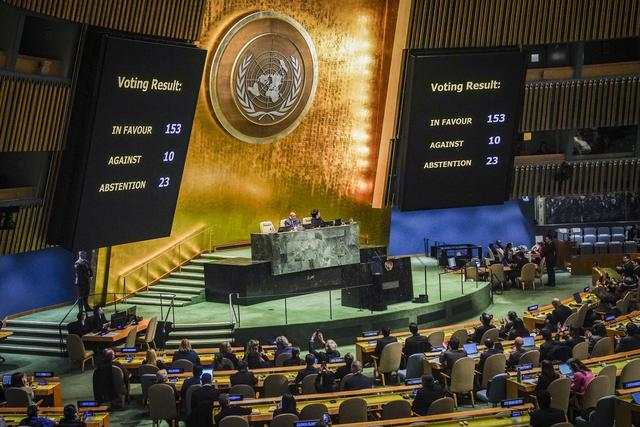
On December 12th local time, US President Biden stated that Israel's "indiscriminate" bombing of Gaza is causing it to lose support, and Israeli Prime Minister Netanyahu should make changes. Biden made the above statement during his speech to donors for the 2024 election.
Foreign comments indicate that this is Biden's harshest criticism of Netanyahu's handling of the Gaza War to date, in stark contrast to Biden's verbal and political support for Netanyahu after the Hamas attack on October 7th. President Biden's statement exposed a new rift between the US President and the Israeli Prime Minister.
On December 12th, the United Nations General Assembly voted to pass a draft resolution submitted by Egypt and Mauritania, calling for an immediate ceasefire in the Palestinian Israeli conflict area and the release of all hostages. In addition, the document requires all parties to the conflict to comply with international humanitarian law.
It is reported that a total of 153 countries voted in favor of the document, including Russia, Brazil, Iran, Spain, Canada, China, Cuba, the United Arab Emirates, France, Saudi Arabia, Sweden, Switzerland, and others. Another 10 countries have expressed opposition, including Austria, Israel, the United States, and the Czech Republic. 23 countries, including the UK, Germany, and Ukraine, abstained from voting. At the previous United Nations General Assembly, the United States rejected an amendment calling for condemnation of the Palestinian Hamas movement. The United Nations General Assembly also rejected Austria's amendment claiming that Hamas and other organizations are taking hostages.
On that day, the Permanent Representative of Palestine to the United Nations, Riad Mansour, stated that the vast majority of countries voted in favor of achieving a humanitarian ceasefire in Gaza, which was a "historic day". "In terms of the strong signal sent by the United Nations General Assembly, today is a historic day. Our common responsibility is to continue along this path until the aggression against our people ends."
Regarding this, Israeli Prime Minister Netanyahu strongly stated on the same day that Israel has received support from the United States in achieving goals such as destroying Hamas and rescuing hostages taken by Palestinian militants. However, there are differences between the two countries regarding the post-war arrangements in the Gaza Strip.
According to reports, Netanyahu reiterated his past stance, disagreeing with the Western supported Palestinian National Authority led by Abbas to restore its rule over the Gaza Strip and opposing the two state plan with Palestine. He stated in a statement that the Gaza Strip will not be either Hamas Stan or Fatah Stan, and Fatah is a faction led by Abbas. Netanyahu said, "I want to clarify my position: I will not allow Israel to repeat the 'Oslo' mistakes.".
It is reported that the Oslo Agreement signed in 1993 allowed Palestinians to exercise limited autonomy in the West Bank and Gaza Strip. Netanyahu's statement is seen as the strongest response to Biden's statement that Netanyahu "must strengthen and change" the Israeli government in order to find a long-term solution to the Israeli Palestinian conflict.
The statements of the leaders of the United States and Israel have exposed a new rift between the President of the United States and the Prime Minister of Israel.
With the strengthening of Israel's indiscriminate crackdown on the Gaza Strip, the increasing number of civilian casualties in the Gaza Strip, and the intensification of humanitarian disasters, more and more countries around the world have recognized Israel's anti human face, and the call for support for the Palestinian people is growing. The United States is also becoming more cautious in its aid and support for Israel, while criticism is becoming increasingly severe. As for how Israel will make its decision after the United Nations General Assembly, further observation is needed.

Affected by the cooling of market risk aversion sentiment, the gold that had been surging throughout the week ended the day with a sharp decline.
Affected by the cooling of market risk aversion sentiment, …
Recently, according to Reuters, Asian stock markets rose co…
On October 20th, the Argentine central bank announced the c…
Ukrainian President Volodymyr Zelenskyy said in a speech on…
When the Trump administration repeatedly released signals t…
On October 22, 2025, the international financial market onc…